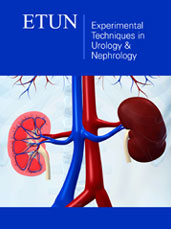- Submissions

Abstract
Experimental Techniques in Urology & Nephrology
Renal Function Markers in Rheumatoid Arthritis: A Case-Control Study from Shendi City
-
Open or CloseYageen Kamal Abdalrazig Ahmed1, Nazar Alsir1, Abdelwahab Abdien Saeed1,
Tibyan Abdalmajed Altaher1, Ghanem Mohammed Mahjaf2, Rahma Abdo
Ahmed Osman1 and Mosab Nouraldein Mohammed Hamad3*
1 Department of Clinical Chemistry, Faculty of Medical Laboratory Sciences, Shendi University, Sudan
2Department of Medical Microbiology, Faculty of Medical Laboratory Sciences, Shendi University, Sudan
3 Assistant Professor, Microbiology Department, Faculty of Medicine, Elsheikh Abdallah Elbadri University, Sudan
*Corresponding author:Mosab Nouraldein Mohammed Hamad, Microbiology department, Faculty of Medicine, Elsheikh Abdallah Elbadri University, Sudan
Submission: September 09, 2025; Published: November 06, 2025

ISSN: 2578-0395Volume3 Issue3
Abstract
Background: Patients with rheumatoid arthritis face a higher risk of developing chronic kidney disease
and glomerulonephritis, which increases mortality, with a hazard ratio (HR) of 2.77-4. 45.
Objective: This study aims to assess urea and creatinine levels in patients with rheumatoid arthritis.
Materials and methods: This cooperative study was conducted in Shendi City, involving a total
sample of 50 individuals, including 30 patients with rheumatoid arthritis as the case group and 20
healthy individuals as the control group. Serum urea and creatinine levels were estimated using a
spectrophotometer biosystem.
Results: This study showed that the levels of urea and creatinine were significantly increased in
rheumatoid arthritis patients, with case levels at (89.43 ± 51.949) and control levels at (38. 38.60 ±
5.707) (P value=0.000) for urea and (3.3529 ± 3.830) for creatinine in patients with rheumatoid arthritis,
with case levels at (3.830 ± 3.3529) and control levels at (0.695 ± 0.1905) (P value = 0. 000). There was
a significant effect of urea levels on age (0.783, P=0.003). A weak association was observed between
creatinine and age (P=0.910). Males exhibited higher levels of both urea and creatinine compared to
females, with urea levels being significantly more affected (P value=0.019) than creatinine levels (P
value=0.343). A significant difference was noted between the groups with and without a family history
of RA (P values of 0.012 and 0.480, respectively). NSAIDs were significantly more effective than the non-
NSAID group in lowering urea and creatinine levels (P values=0.000 and 0.003, respectively).
Conclusion: Patients with rheumatoid arthritis have higher serum levels of creatinine and urea. Many
patients with rheumatoid arthritis frequently experience renal issues and their elevated urea levels
are closely associated with their age and gender. The burden of chronic kidney illness among research
participants may be alleviated by effectively managing positive cases and early screening of RA patients
for renal disorders. Screening for renal abnormalities could help patients with rheumatoid arthritis
prevent renal complications and assess their risk early
Keywords: Rheumatoid arthritis; Creatinine; Urea; Sudanese; Chronic kidney disease
 a Creative Commons Attribution 4.0 International License. Based on a work at www.crimsonpublishers.com.
Best viewed in
a Creative Commons Attribution 4.0 International License. Based on a work at www.crimsonpublishers.com.
Best viewed in 







.jpg)






























 Editorial Board Registrations
Editorial Board Registrations Submit your Article
Submit your Article Refer a Friend
Refer a Friend Advertise With Us
Advertise With Us
.jpg)






.jpg)














.bmp)
.jpg)
.png)
.jpg)










.jpg)






.png)

.png)



.png)






